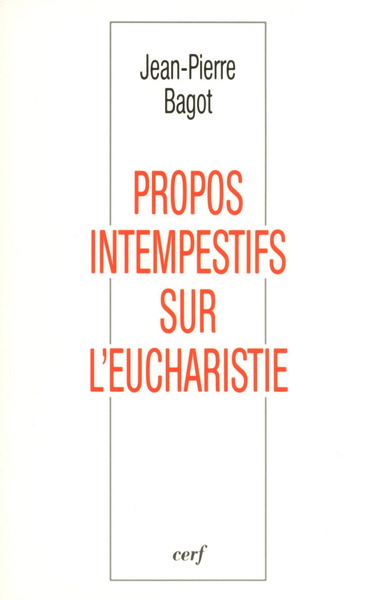- EAN13
- 9782204079792
- Éditeur
- Cerf
- Date de publication
- 17 novembre 2005
- Collection
- THEOLOGIE
- Nombre de pages
- 87
- Dimensions
- 21,4 x 13,4 x 0,7 cm
- Poids
- 140 g
- Langue
- fre
Propos Intempestifs Sur L'Eucharistie
Jean-Pierre Bagot
Cerf
Prix public : 15,40 €
Jésus a appelé ses disciples à partager le pain et le vin en faisant mémoire de lui. Ce geste renvoyait manifestement à la façon dont, tout au long de sa vie publique, il avait partagé le repas avec tous, même avec les exclus de la société et de la communauté religieuse officielle. Il annonçait par là le " repas messianique ", grand rassemblement de l'humanité dans le royaume à venir. Ce partage constituait un tel bouleversement de la tradition, si spontanée en l'homme, de ne partager le repas qu'avec les proches, qu'on pouvait parler d'une véritable descente du ciel sur la terre. Mais il y a là plus qu'une simple question de nourriture. Le geste eucharistique hérité du Christ dit la découverte de la fraternité humaine, en l'absence de laquelle personne ne peut vraiment vivre. " L'homme ne vit pas seulement de pain, mais de toute parole qui sort de la bouche de Dieu ", dit l'évangile. Et quelle que soit la forme de cette parole, elle dit toujours l'amour. Jean-Pierre Bagot relit quelques textes récents du magistère sur l'eucharistie. Il dialogue aussi avec la tradition, qui ne saurait être simplement lettre morte. Surtout, il met en lumière une responsabilité qui incombe à tous ceux qui célèbrent l'eucharistie : à la lumière de l'évangile, découvrir et proposer le sens eucharistique de gestes humains en lesquels nous trouvons les germes d'un monde nouveau où s'effondrent les frontières et les exclusions, d'un monde où travaille l'Esprit. Un monde à bâtir aujourd'hui. -- Jesus called upon his disciples to share bread and wine in memory of him. This gesture clearly referred to the way in which, all during his public life, he had shared his meals with everyone, even those who had been excluded from society and the official religious community. His announcement heralded the "messianic feast', the grand assembly of humanity in the Kingdom to come. This sharing was such a turnaround of the tradition, so instinctive in man to eat only with friends and family, that we may think of a true descent from heaven to earth. But this story isn't just about food. The Eucharistic act inherited from Christ tells of the discovery of human fraternity, without which no one can really live. "Man shall not live on bread alone, but on every word that proceeds out of the mouth of God,' as the Gospel says. And whatever form that word takes, it is always expressing love. Jean-Pierre Bagot reads some recent texts on the Eucharist from the magisterium. He also maintains the link with tradition, which cannot go unheeded. But especially, he underlines the responsibility that falls upon all those who celebrate communion: in the light of the Gospel, to discover and propose the Eucharistic meaning of human gestures, in which we find the seeds of a new world where borders will be broken down and exclusions will be no more, a world where the Spirit is at work. A world we must begin to build today.


















